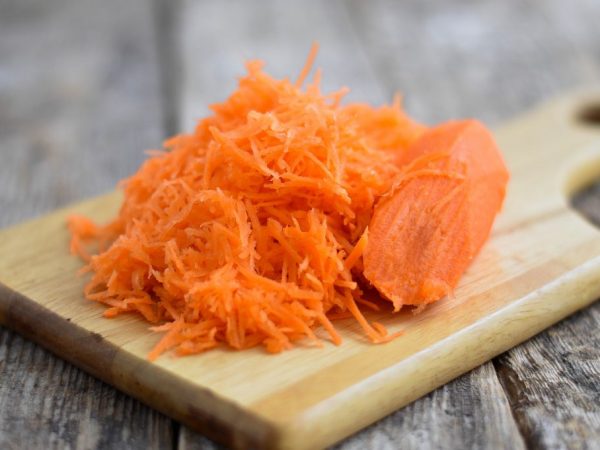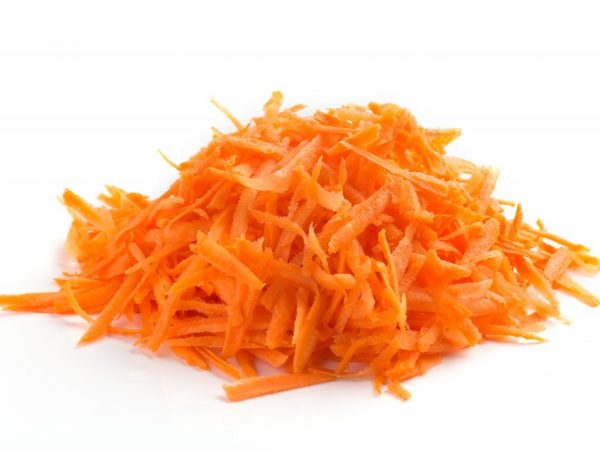Benefits of raw carrots for a child
Raw carrots for a child under one year old are allowed only in the form of juice closer to 8-9 months. This is a storehouse of vitamins, but it must be used wisely so as not to harm. The substances contained in the root vegetable can cause allergies, impairments to the functionality of the gastrointestinal tract, so it is better to consult a pediatrician first.

Benefits of raw carrots for a child
The benefits of root vegetables for children
Carrots for small children are a full-fledged source of beta-carotene - a substance involved in the synthesis of vitamin A. The mineral is used by the body in metabolic processes, the formation of skin, mucous membranes, bones, teeth. Lack of vitamin A and beta-carotene worsens the body's resistance, negatively affects vision, the condition of the skin, which provokes the appearance of eczema and other dermatoses at an early age.
Other minerals present in carrots include:
- calcium;
- sodium;
- phosphorus;
- potassium;
- folic acid.
Carrots are rich in fiber, pectin, which has a positive effect on the digestive processes. Recommended for constipation. Able to have a mild laxative effect. Vitamins of group B, E and C improve the state of the immune system, participate in the processes of building the central nervous system, which is extremely important in childhood. The health and development of the baby directly depends on its functioning.
Side effects and contraindications
Carrots are useful for one-year-old babies, but in reasonable quantities. It is a potent allergen and excessive consumption causes carotene jaundice. In such cases, the following is observed:
- yellowing of the skin of the feet, palms;
- decreased appetite;
- nausea, vomiting, diarrhea.
All these symptoms go away as soon as the product is excluded from the diet. It will be possible to give it again with extreme caution and under the supervision of a doctor. If the baby is allergic to a root vegetable, urticaria appears, in rare cases, laryngeal edema, consult a doctor and conduct an examination of the gastrointestinal tract, change the diet, choose a more gentle diet
Until a year, it is not recommended to introduce carrots into the diet. A contraindication is a pathology in the work of the gastric tract.
Complementary feeding time

It is often not recommended to eat carrots.
Carrots, as complementary foods in their raw form, are introduced only after a year. It is poorly digested, not yet fully formed gastrointestinal tract, which leads to serious disorders. Complementary foods in the form of steam or boiled puree are introduced together with other vegetables, at the age of 7 months. For children who are bottle-fed, it is permissible to give mashed potatoes 2 months earlier. The root crop should be introduced into the diet only after getting acquainted with potatoes, broccoli, onions (all in the form of mashed potatoes).
Vegetable juice is allowed for a baby at 8-9 months. For the first time, it is better to give ½ tsp. in the morning hours. The reaction is monitored throughout the day. Do not give carrot juice or puree daily.Prepare dishes using root vegetables 2-3 times a week, then gradually add pumpkin to the diet.
These times are standard, but may vary depending on:
- the state of health of the baby (during the period of illness, children are not introduced into the diet of new products);
- reactions to other vegetables;
- the number of vegetables introduced into the diet;
- individual features of the intestines.
Raw root vegetable introduction
The benefits of raw carrots for the child's body are much greater than those of boiled ones. Freshly squeezed juice retains all the beneficial properties, helps to accelerate the growth of toddler. It is recommended to introduce a raw root vegetable into the baby's diet per year.
For the first time, it should be just juice or a small amount of carrots grated on a fine grater. A little later, you can make a salad by mixing the root vegetable with an apple. Add a couple of drops of vegetable oil or unsweetened yogurt (low-fat sour cream) to a salad with vegetables.
The optimal amount of vegetable consumption
It is important to observe the dosage in everything related to baby food. Children of 2-3 years of age can already easily eat carrots a day on their own. Make sure that the amount consumed does not exceed 1000 mg in 2 days.
Exceeding the specified norm leads to the appearance of a rash, indigestion. Children can consume freshly squeezed root vegetable juice with an apple 50 ml every 2-3 days. It should be borne in mind that the child's gastrointestinal tract is not yet sufficiently adapted to the aggressive acids contained in fresh juices, so it is better to dilute them with boiled water.
Choosing a quality product
The choice of a quality root vegetable is the key to the health of your baby.
- the shape of the carrots should be natural, without bends, pineal processes;
- the skin is smooth, bright orange, without various dark inclusions;
- if you need to keep raw carrots fresh longer, you should give preference to specimens with tops: at home, be sure to cut them off, otherwise the foliage will pull out all the juices from the fruit;
- give up buying sluggish vegetables with blackened tips;
- useful properties are preserved in elongated fruits of medium size with a weight of 150-200 g;
- too thick fruit contains a lot of nitrates, bitter, practically without juice, difficult to clean and causes inconvenience in cooking.
Cooking features
When peeling carrots, cut off the peel, partially capturing the pulp, about 0.5 cm (especially for large fruits). Shorten the top and bottom by at least 1 cm. If young children will not try complementary foods for the first time, mix carrots with mashed potatoes and broccoli. Before heat treatment, wash the fruit thoroughly, cook until tender, grind in a blender.
You can steam the carrots. Then it will retain more nutrients. Carrots are useful in any form. The processed vegetable practically does not lose valuable substances, it is much better absorbed. Heat breaks down the fiber, releasing beta-carotene.
You can make a healthy vegetable soup with carrots by adding broccoli, onions, and chicken liver. For the little ones, grind the mixture in a blender. Older children are given whole cooked soup ingredients.
Conclusion
Carrots are tasty and healthy, but in reasonable quantities. You can give raw carrots to a child only when they reach 2-3 years of age. If you experience any unpleasant symptoms after starting complementary foods, immediately discard the product, otherwise irreparable harm will be done. See your doctor just in case. Symptoms of intolerance to the product can signal more serious abnormalities in the functioning of systems and organs.


